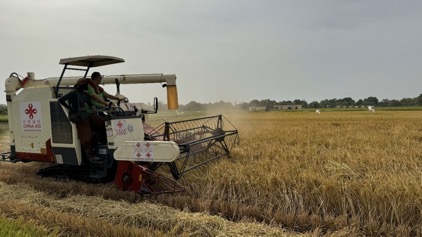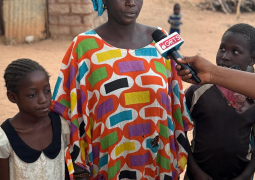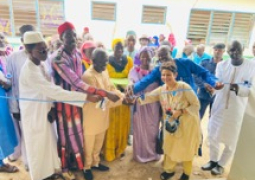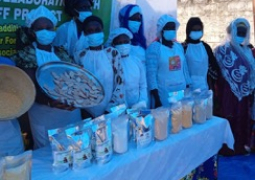
The move would be followed by the next harvesting of the Sahel 134 and IR 841 rice varieties from a total of 2.5 hectares in the next two weeks.
The rice production of the project is entirely carried out through mechanisation from plough, transplant to the harvest and process periods, which saves time and hard labour with high and improved productions.
The daily production capacity of the rice combine-harvester and transplanting machine introduced to this project, is divided into 4-5 hectares and 2-3 hectares.
The project is based on the exchange notes between the Governments of the People’s Republic of China and the Republic of The Gambia.
The implementers, Yuan Longping High-tech Agriculture Co., Ltd (LPHT) and Central Project Coordination Unit (CPCU) launched the project in April 2019, with a focus on promoting hybrid rice, fully mechanised rice production, and agricultural technology training.
Over the years, the project has centered around the Sapu core rice demonstration area, fully utilising the advantages of LPHT’s hybrid rice variety, and exploring high-yield rice cultivation models that are in line with local climate characteristics and irrigation methods.
The project focuses on time nodes, transplanting methods, and water and fertilizer management, standardised production processes for rice grains/seeds during the rainy and dry seasons have been developed.
“The core demonstration area of the project showcases a total of 20 high-yield demonstration cultivation varieties, covering all 11 mainstream conventional rice varieties and 9 Chinese hybrid rice varieties in the local area.”
The maximum yield of hybrid rice is 9.35 tons per hectare (with an average yield of about 8 tons), which is 1.6-2 times the local conventional rice yield.
Meanwhile, the project has registered two rice varieties in The Gambia, which included the GMB LS 123 and GMB LS 2021.
Through the continuous technical output of the project, the farmers and private enterprises contacted by the project have benefited from it, with over 1800 local personnel participating in the technical training organised by the project.
It has served a pivotal role in providing guidance to Maruo Farms in Central River Region to improve the high yield of their rice production, which then had the capacity to expand from 10 to 100 hectares though mechanization. At present, Maruo farms has preliminarily achieved full mechanisation of rice production.
In addition, the project is constructing a vegetable production demonstration center in Jambanjelly, with vegetable facility cultivation demonstration (greenhouse 6000㎡ ) and technology training as the key functions of the demonstration center.
At the same time, the project is set to expand 80㎡ of combine rice milling house, 600㎡ of drying floor, 1000m Fence and harden 950m of drainage channels in Sapu core demonstration area.
Also, through the implementation of the project, it is envisaged that it will significantly increase the efficiency of production of staple food crops and vegetables in the Gambia, improve post-harvest processing and management capacity, increase the income of Gambian farmers, ensure food security and contribute to the achievement of the "Zero Hunger" target.
Read Other Articles In National News

‘ChildFund's cash impacts access to education, retention in rural Gambia’
Feb 28, 2025, 11:51 AM




